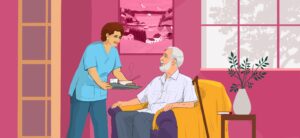Build your future here with ISANS
Last year, ISANS worked with over 10,000 clients to build a future in Nova Scotia. At ISANS, we help you find your pathway to possibility.

Gain experience and start your licensing process
Our profession-specific bridging programs offer:
- access to accurate information about the licensure process in your field
- training sessions and workshops with experts in medicine, pharmacy, dentistry, nursing, and finance
- opportunities to complete work-based engineering or trade competency assessments with a Nova Scotian employer
Begin by meeting with an Employment Specialist who will help you create a special plan of action for your short and long-term goals, and who will recommend appropriate programs for you.

Regulated Professions
If you work in a regulated profession, you will need a license, certificate or registration to practice in your field. The pathway to licensure for your profession will show you how to get your qualifications assessed and recognized.
The professions listed on this page will provide you with information about:
- Pathways to licensure
- Profession-specific programs
- Alternative careers
- Resources and links
For more help, or if your occupation isn’t listed, please contact your Employment Specialist.
Architecture is a regulated profession in Canada. To practice independently, you must have your qualifications recognized and be licensed. The Nova Scotia Association of Architects is responsible for regulating the practice of architecture in Nova Scotia but to begin, apply to the Canadian Architectural Certification Board (CACB). There are two pathways to licensure. You will need to find a Canadian licensed architect as a mentor or employer because experience in Canada is necessary for both pathways. Contact an Employment Specialist at ISANS for help with contacting local firms as well as assistance with your resume & portfolio, learning interview skills, understanding Canadian workplace culture and accessing financial assistance for the costs of accreditation. Get started today!
Pathway to Licensure
Useful Links & Resources
Internationally Educated Dental Professionals (IEDPs) regardless of their education, licensure or experience, must obtain a license to practice their profession in Canada. Each province or territory has its own licensing organization that sets the requirements and regulates the practice of the dental profession and specialties within the jurisdiction.
Contact an Employment Specialist at ISANS for help in understanding the pathway to licensure, getting assistance in developing your resume, learning interview skills, understanding Canadian workplace culture and accessing financial assistance for the cost of accreditation. Get started today!
- Pathway to Licensure - PDF - Dentists
- Pathway to Licensure - PDF - Dental Hygienist
- Pathway to Licensure - PDF - Dental Assistant
Internationally Educated Dental Professionals (IEDPs) Bridging Program
As an Internationally Educated Dentist (IED), you will have an opportunity to participate in formal study groups with fellow immigrant dentists and the Immigrant Services Association of Nova Scotia-IEDP Bridging Program Coordinator. Attending the study groups will allow you to share knowledge, experience, resources and will encourage learning while utilizing expertise from colleagues in the group. On-site books, materials and electronic resources are used to facilitate these sessions.
Resources
Internationally Educated Engineers come to Canada with various levels of valuable experience and education. In Canada, all engineering graduates must complete four years of supervised work under a Professional Engineer (P. Eng.) and write an exam in Law and Ethics before they can become a P. Eng. Each province has its own professional organization that sets the requirements but the designation is accepted across Canada. Engineers Nova Scotia is the professional organization for engineers in Nova Scotia.
Pathway to Licensure
Internationally Educated Engineers (IEE) Bridging Program
The Internationally Educated Engineers (IEE) Bridging Program at ISANS assists IEEs with understanding the Canadian work environment, providing competency assessment program, understanding the pathway to licensure in Nova Scotia and supporting the IEE’s individual path with courses and support groups through the following programs.
Learn more about the IEE Bridging Program...
Resources
Engineers Nova Scotia
Engineers Nova Scotia is the licensing and regulatory body for Professional Engineers and Engineers-in-Training in Nova Scotia.
1355 Barrington Street, Halifax, NS B3J 1Y9
Phone: (902) 429-2250
Toll Free: 1-888-802-7367
E-mail: info@engineersnovascotia.ca
Website: www.engineersnovascotia.ca
As a Lawyer, you already know that every country has its own laws and judicial system. The challenges you will face in qualifying to practice in Canada will depend on whether the legal system of your first country is Common Law, Civil Law, religious law or a combination. Except for the province of Quebec, Canada’s legal system is based in Common Law.
In the province of Nova Scotia, the best place to start the process is at the Nova Scotia Barristers’ Society. The Pathway to Licensure diagram will help point out your options. An Employment Specialist at ISANS can help you figure out the pathway(s) that can work for you.
Observership Program for Internationally Trained Lawyers
If you are interested:
- talk to your Employment Specialist
- download the information package and application form: ITL Observership Application
Other Useful Websites for Internationally Trained Lawyers
- Nova Scotia Barristers Society
- National Committee on Accreditation
- Canadian Bar Association – Nova Scotia
- Schulich School of Law, Dalhousie University
- Masters of Law (LLM) Common Law Program, University of British Columbia
Online NCA Exam Prep Program – Osgoode Hall Law School – York University
This program is specifically designed for internationally qualified lawyers and law graduates planning to write the National Committee on Accreditation’s 5 mandatory examinations. The Online NCA Exam Prep Program offers instruction in the following subjects:
- Foundations of Canadian Law
- Canadian Constitutional Law
- Canadian Administrative Law
- Canadian Criminal Law
- Professional Responsibility
Internationally Educated Medical Laboratory Technologists (IEMLTs) regardless of their education, licensure or experience, must obtain a license to practice their profession in Canada. Each province or territory has its own licensing organization that sets the requirements and regulates the practice of medical laboratory technology profession. This means that you must hold a license to be able to practice medical laboratory technology in Nova Scotia.
Contact an Employment Specialist at ISANS for help in understanding the pathway to licensure, getting assistance in developing your resume, learning interview skills, understanding Canadian workplace culture and accessing financial assistance for the cost of accreditation.
Pathway to Licensure
Resources and Important Links
Other Helpful Links for MLTs
- Westgard QC
- Microscopy
- Canadian Association of Medical Laboratory Educators (CAMLE)
- The Quality Management Program – Laboratory Services
- Quick Reference Guide - Response to Transfusion Reaction
Company resource material
Venipunture: watch the video
Hematology: use the online Atlas of Hematology to supplement your study from a reference textbook
Transfusion Science: Canadian Blood Services
- Quick Reference Guide - Response to Transfusion Reaction
- Model Transfusion Reaction Report Form (includes section that serves as blood collection record)
- Safe Transfusion Practice videos (view online)
- Bloody Easy Blood Administration (Handbook content mainly from "Bloody Easy for Nurses" online course)
Microbiology: UOIT Microbiology Virtual Lab
Special Stains: Anatomy-Histology Tutorials (for special stains)
Histology: Image Bank
There are two types of nurses in Nova Scotia: Registered Nurses and Licensed Practical Nurses. A Registered Nurse (RN) has a 4 year Bachelor of Nursing degree from a university. A Licensed Practical Nurse (LPN) has a 2 year diploma from a Community College.
To find out how to get your nursing qualifications assessed as a Registered Nurses contact the College of Registered Nurses of Nova Scotia. For Licensed Practical Nurses contact the College of Licensed Practical Nurses of Nova Scotia. If you’re not sure which kind of nurse you are, either College will give you advice.
Contact an Employment Specialist at ISANS for help in understanding the pathway to licensure, getting assistance in developing your resume, learning interview skills, understanding Canadian workplace culture and accessing financial assistance for the cost of accreditation.
Registered Nurses
Licensed Practical Nurses
For information about how both types of nurses work together in the healthcare system check out the following resources:
- College of Licensed Practical Nurses - Assignment and Delegation Guidelines
Nova Scotia needs nurses – particularly in long term care facilities and rural communities – so get started today!
Helpful Links
Registered Nurses Professional Development Centre
- Orientation to the Canadian Healthcare System for Internationally Educated Healthcare Professionals
- Exam Preparation Support
- Bridging Program
Toll Free: 1-800-461-8766
Fax: (902) 473-7590
rnpdc@nshealth.ca
www.rnpdc.nshealth.ca
Self-Assessment
This self-assessment tool is designed to help you understand the Canadian licensed practical nursing profession. The tool will outline the competencies, skills, and abilities that licensed practical nurses must have to apply for licensure or registration in a Canadian province or territory
Pathway to Success for Internationally Educated Nurses (for LPNs)
For information about how both types of nurses work together in the healthcare system check out the following resources:
- College of Licensed Practical Nurses – Assignment and Delegation Guidelines
- PEI Health Sector Council
Other Resources
- Nova Scotia Health Authority - Library Services - ISANS
- Resources and Support Services for Internationally Educated Nurses in Nova Scotia
- Canadian English Language Assessment Services (CELAS) Centre
English language assessment for the nursing profession
Try the CELBAN Readiness Self-Assessment: www.celban.org/celban
There are many different healthcare professions in Canada. You need a license to practice in most of them. Here are some useful links to information about some of these professions. The best place to start is to contact an Employment Specialist at Immigrant Services Association of Nova Scotia who can help you understand the pathway to licensure, and find programs to help you work in your field.
Contact an Employment Specialist at ISANS for help in understanding the pathway to licensure, getting assistance in developing your resume, learning interview skills, understanding Canadian workplace culture and accessing financial assistance for the cost of accreditation. Get started today!
Resources
Occupational Therapists
- Intenationally Educated Occupational Therapists Portal
- Association of Canadian Occupational Therapy Regulatory Organizations
- College of Occupational Therapists of Nova Scotia
- Occupational Therapy Examination & Practice Program (OTepp)
Dietitians
- Nova Scotia Dietitians Association
- Pathway to Licensure
- Dietitians of Canada
- Mount St. Vincent University
Physiotherapists
International Pharmacy Graduates (IPGs) regardless of education, licensure or experience must obtain a license to practice their profession in Canada. Each province or territory has its own licensing organization that sets the requirements and regulates the practice of the pharmacy profession within the jurisdiction. Nova Scotia College of Pharmacists is the regulatory body for pharmacy practice in Nova Scotia.
Contact an Employment Specialist at ISANS for help in understanding the pathway to licensure, getting assistance in developing your resume, learning interview skills, understanding Canadian workplace culture and accessing financial assistance for the cost of accreditation. Get started today!
Pathway to Licensure
Pharmacists’ Gateway Canada provides licensing information, self-assessment tools and a centralized document repository for International Pharmacy Graduates:
- Pharmacists Gateway Canada
- What are the Steps to Licensure
- Obtaining a License
- What are the Steps to Enroll
International Pharmacy Graduate (IPG) Bridging Program
The International Pharmacy Graduates (IPGs) Bridging Program at ISANS assists IPG’s with understanding and meeting standards of practice in Canada and achieving professional goals such as licensure and employment.
For more information and program details please visit the IPG Bridging Program page.Onsite and Online Resources
ISANS has a library of textbooks and reference books that IPG’s can borrow. There is also a reference lists of PowerPoint presentations and websites that can be accessed through ISANS online learning community.
To be referred to the IPG Bridging Program, please contact your employment specialist.Resources
Related Articles
- You can help an International Pharmacy Graduate to become licensed in Nova Scotia Mohja Alia, PANS – November 2011
- The International Pharmacy Graduates (IPG) Multi-stakeholder Work Group: A collaborative approach to welcoming and integrating new colleagues into the Pharmacy Profession Jan Sheppard Kutcher, PANS – February 2011
International Medical Graduates (IMGs) regardless of education, licensure or experience, must obtain a license to practice their profession in Canada. Each province or territory has its own licensing organization that sets the requirements and regulates the practice of the medical profession and specialties within the jurisdiction. The College of Physicians and Surgeons of Nova Scotia (CPSNS) is the regulatory body for medical doctors and surgeons in Nova Scotia.
Contact an Employment Specialist at ISANS for help in understanding the pathway to licensure, getting assistance in developing your resume, learning interview skills, understanding Canadian workplace culture and accessing financial assistance for the cost of accreditation.
Pathway to Licensure
International Medical Graduates (IMG) Bridging Program
The IMG Bridging Program offers a number of programs, services, and resources to support IMGs entry into the Canadian healthcare system. Learn more about the IMG Bridging Program.
To register for the IMG Bridging Program please talk to your Employment Specialist.
Resources
Nova Scotia needs skilled tradespersons and there are many designated trades in Nova Scotia. Some are “compulsory certified trades” under the Apprenticeship and Trades Qualification Act. This means that you must have a Certificate of Qualification or be an apprentice (learning on-the-job) to work legally in that trade. Most trades are not compulsory. Click here for a list of the compulsory and non-compulsory trades in Nova Scotia.
Contact an Employment Specialist at ISANS for help in understanding the pathway to licensure, getting assistance in developing your resume, learning interview skills, understanding Canadian workplace culture and accessing financial assistance for the cost of accreditation. Get started today!
General Information for Immigrant Tradespersons
Other Helpful Links: Construction Trades
There is good news and bad news for you as an internationally educated teacher settling in Nova Scotia. The good news is that, as a teacher, you have many skills and competencies, which you can use to find satisfying work here! The bad news is that because of a declining birth rate in Canada, there are very few openings in the public school system at this time. As older teachers start to retire, it’s very possible that this situation will change but for now, you’ll need to explore other teaching-related careers. These challenges face all new teachers whether educated in Canada or internationally.
As an internationally educated teacher, it may still be useful to apply for a Nova Scotia teacher’s certificate. It can be a useful credential for other jobs. The Pathway to Licensure shows you the steps to take. Contact your Employment Specialist for help with navigating the pathway, setting career goals and exploring alternative careers.
Other Helpful Resources
- Teach in Nova Scotia - a comprehensive overview of the teaching profession in Nova Scotia
- Alternative Careers for Teachers
- Independent Schools
Resources
Self Assessment Tool for Technicians and Technologists
Internationally educated engineering technicians and technologists can sign up on this website and complete the self-assessment tool. This tool will help you in identifying your skills according to the Canadian engineering technology system.
Nova Scotia Tourism Human Resource Council
Discover Tourism - A national website that provides information about the tourism industry
A veterinarian in Canada is a doctor of veterinary medicine (DVM), a professional in animal health care who has completed a university degree at a veterinary college. Almost 75% of Canada’s veterinarians work in private practice. Close to 40% work exclusively with small animals, while approximately 35% work in large and mixed animal practice. Veterinarians are also involved in many other activities that protect both animal and human health. (Source)
Resources
This program is funded in part by the Government of Canada's Foreign Credential Recognition Program and Government of Nova Scotia’s International Qualifications Recognition Program
ISANS Employment & Bridging Programs
Visible Minority Newcomer Women at Work
If you are a visible minority, newcomer woman who needs help finding employment in your…
Trades Practical Assessment
Do you want to demonstrate your skills to a potential employer in your trade? Are…
Strategies for IELTS™
In this course for newcomers who have a Canadian Language Benchmark (CLB) level of 6…
Strategies for CELBAN
Strategies for CELBAN is an online course for internationally educated nurses who plan to take…
Long-term Care Aide (LTCA) and Disability Support Worker (DSW) Program
Are you looking for a career where you can make a meaningful difference by helping…


